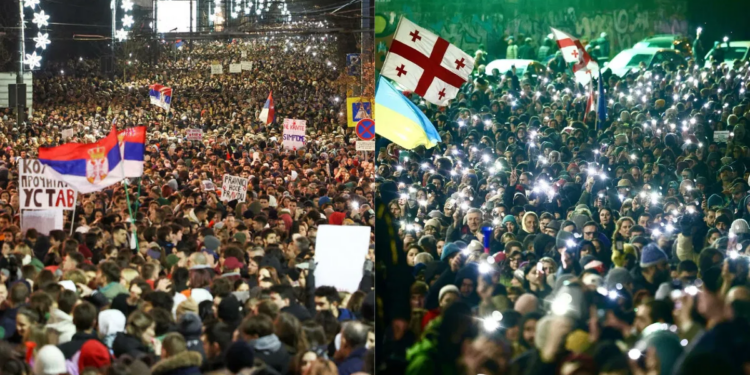Looking at the floods of people continuously taking to the streets in anger, one might be tempted to see two twin movements. But a closer look reveals distinct contexts that fuel these two independent struggles.
Triggers: tragedy and turn
In both nations, anger had been building for years until the final drop in the glass caused it to burst. In Serbia, the tragic infrastructure collapse was a stark reminder that corruption will eventually claim people’s lives. In Georgia, it was the government’s declared foreign policy reversal—a shift that, if left unopposed, protesters fear, could be existentially fatal for the country.
On November 1, a canopy in front of the newly rebuilt train station in Serbia’s second-largest city, Novi Sad, collapsed, claiming 15 lives. The tragic event reignited the corruption claims on this Chinese-funded railway infrastructure project, whose details remain classified. The lack of transparency, characteristic of President Aleksandar Vučić’s administration, appears to have reached a breaking point. A few weeks later, on November 22, students and professors holding a vigil outside the faculty of dramatic arts in Belgrade were attacked by individuals affiliated with the ruling Serbian Progressive Party (SNS). This led students to occupy the faculty. Soon, the government was facing a broad protest movement led by students.
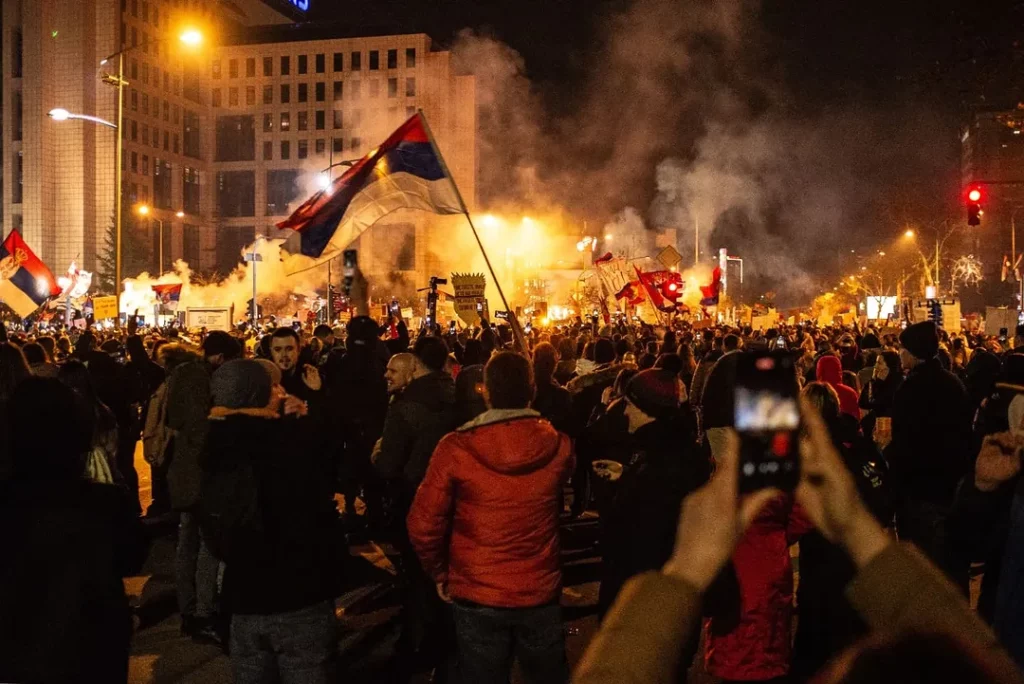 Protest rally in Novi Sad, Serbia, February 3, 2025; Photo: Lenka Pavlović/Instagram
Protest rally in Novi Sad, Serbia, February 3, 2025; Photo: Lenka Pavlović/Instagram
The Novi Sad tragedy and an attack on students in Belgrade were “the triggers of accumulated anger and frustration with the domestic capture of the state by the current government and the president,” tells us Ivan Vejvoda, a veteran Serbian researcher, now a permanent fellow at the Institute for Human Sciences in Vienna.
In Georgia, the trigger came on November 28, when the ruling Georgian Dream (GD) government decided to shelve EU accession efforts “until 2028.” This came after disputed parliamentary elections in October and followed widespread protests against Russia-styled laws to stifle CSOs and media that had raged since the spring. For many Georgians, the ruling party’s drift away from the EU represented a final break from the pro-Western path and—by association—a bet on Russia.
While protests in Serbia seem to be triggered by governance issues, the Georgians’ outrage has a geopolitical dimension. Does the apparent absence of the geopolitical element set the tone of Serbian protests apart?
Symbols and meanings
One routinely sees the EU flags flying alongside the Georgian ones during the protests; sometimes, one can spot the Ukrainian, U.S., and German flags. Not so in Serbia. There, the state flags fly, intermingled and often dominated by the protest symbols – blank canvases with bloody handprints, symbolizing that the government’s hands are in the blood of people who died in Novi Sad.
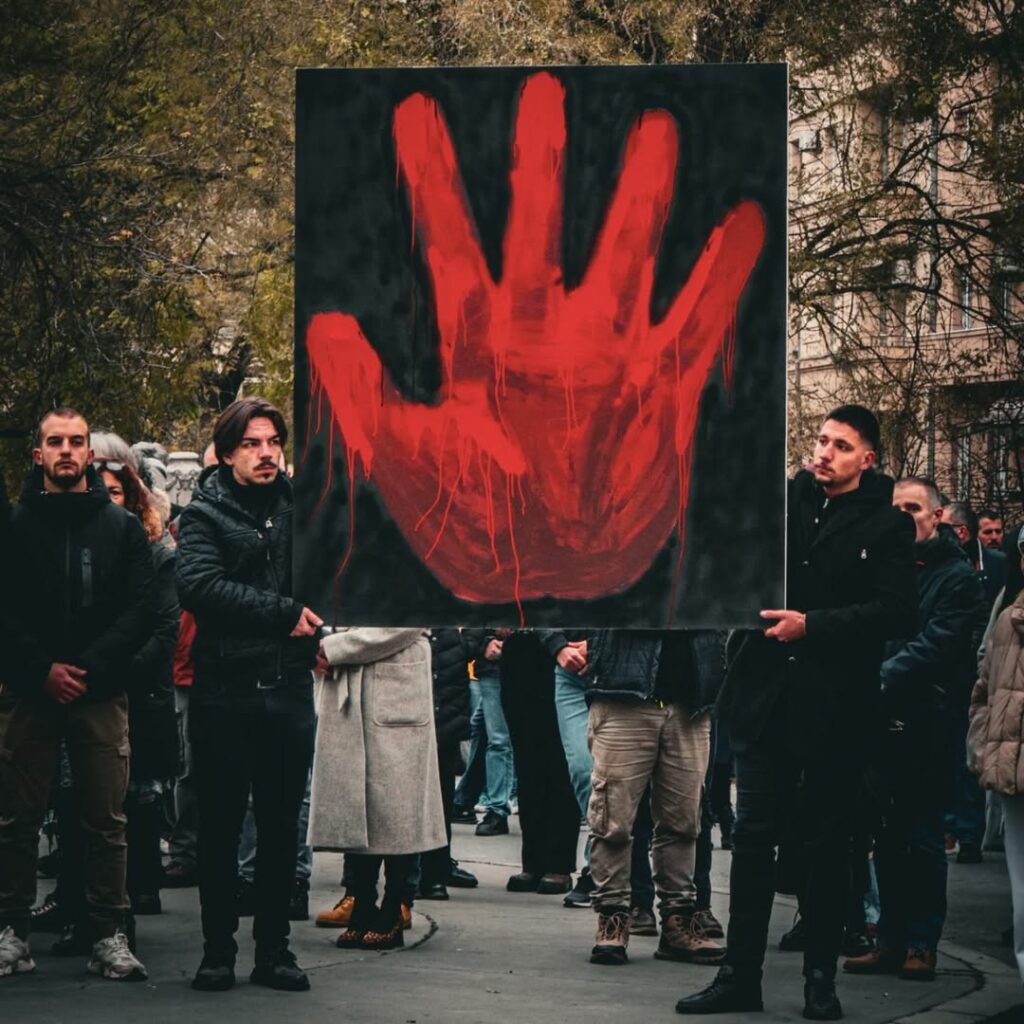 Serbian protesters hold a banner with a bloody handprint, December 13, 2024; Photo: Danica Andjelic /Instagram
Serbian protesters hold a banner with a bloody handprint, December 13, 2024; Photo: Danica Andjelic /Instagram
If the Serbian protesters are focused on domestic affairs, such as corruption and other governance issues, that is because foreign policy aspirations do not unify Serb protesters as much as Georgians.
“Anything related to geopolitics will only bring polarization among people who are united against all the wrongdoings of the Serbian government,” says Milan Vujic, a 27-year-old Serbian lawyer and activist who has actively participated in the movement. If protesters start bringing in EU flags, he adds, “it can only bring internal debates and polarization into the protests, which is not needed at all.”
If we look at the opinion polls on EU membership, the difference is stark. A 2024 IRI poll found that only 40% of Serbians would vote to join the EU, while the recent polls in Georgia showed support for EU membership at 86%, a stable share in the past decades. While the EU serves as a unifying cause for Georgians, it is divisive for Serbs.
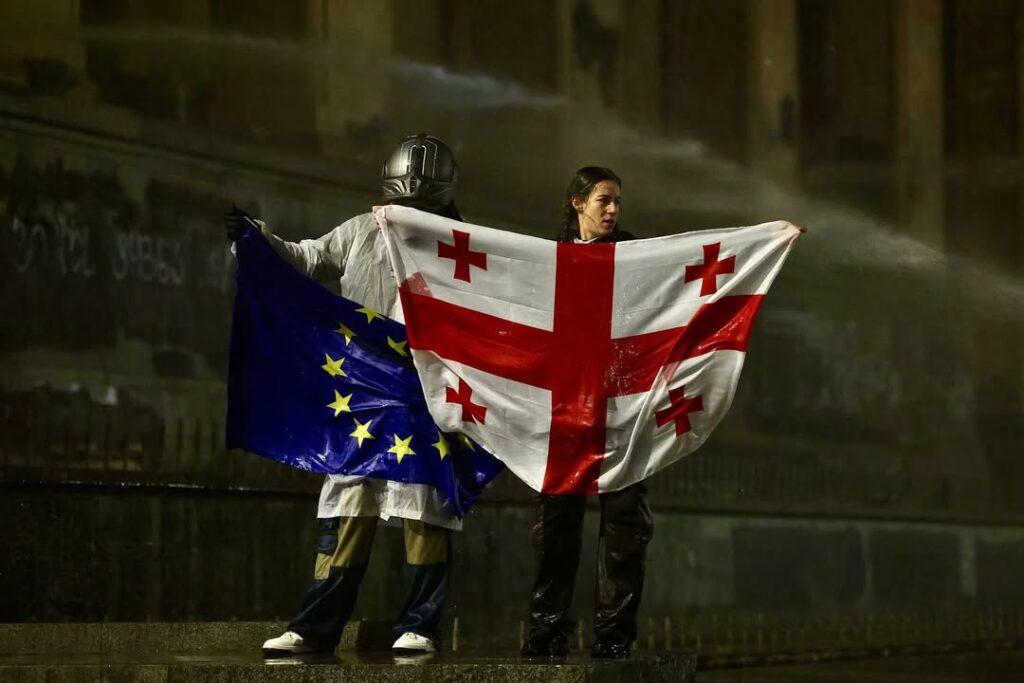 Georgian protesters holding Georgian and EU flags face water cannons near the parliament in Tbilisi, December 1, 2024: Guram Muradov/Civil.ge
Georgian protesters holding Georgian and EU flags face water cannons near the parliament in Tbilisi, December 1, 2024: Guram Muradov/Civil.ge
What is more, the foreign policy stances of the two governments are fundamentally different. While Georgia’s ruling party has found itself isolated from the Western world because of its apparent pro-Russian orientation and actions, Serbia’s government remains committed, at least outwardly, to EU integration. It reiterates that the EU is the country’s “strategic orientation” and, unlike the GD, it has never abandoned the EU path. Despite what citizens see as backsliding on “fundamentals” – rule of law, democratic governance, etc. – Serbia is meeting necessary technical benchmarks moving ahead in membership negotiations.
President Vučić continues to be well-received by Western leaders, who see him as a reliable partner. Vučić is “leaning westwards,” says Vejvoda, pointing to three key factors related to security and commercial geopolitics. One is that despite not imposing sanctions on Russia, Serbia has also backed Ukraine and supplied much-needed artillery shells. Secondly, Serbia has purchased fighter jets from France, signaling a shift away from its security dependence on Moscow, and granted Belgrade airport concession to France. Thirdly, Serbia and the EU signed a deal last year to develop a lithium mining project to boost the bloc’s battery and electric vehicle production.
For these reasons, Vejvoda argues, Western leaders – especially in the EU – have been willing to overlook Vučić’s flawed domestic governance. “Because of the geopolitics of the world […] they have turned a blind eye to democracy” up until these protests, he argues. But “the price we have paid is that domestically he [Vučić] has basically degraded Serbian democracy; he has destroyed the separation of powers; he has captured the judiciary and the prosecution; the media scene is not good because he controls the four national frequency [TV] channels,” the researcher continues.
The resulting contrast in the EU’s response to the two protests has been striking. In Georgia, where the people want their pro-EU efforts recognized, and the government has effectively broken off any dialogue with Brussels, EU officials have been vocal about their concerns and even imposed limited visa sanctions. Meanwhile, in Serbia, where Vučić maintains his ties with Brussels, the EU response has been much more muted.
Yet, in Georgia, the pro-Western sentiment is not only geopolitical. It can also be seen as a shorthand for the desired governance model. The rallies against the “foreign agents” law dubbed it the “Russian law” because the implementation of such legislation brings the country into the Russian model of governance—despotic, corrupt, arbitrary, and fundamentally unfree.
Demands must be met…
There is no end in sight for either protest movement. Both stubbornly insist they won’t stop until their demands are met. Though articulated differently, both ultimately point to the same goals – justice and regime change.
The Georgians demand new elections, which can only be meaningful if they are free of the ruling party diktat. After the October 26 elections, confidence in the Central Election Commission plummeted, and there is talk of holding the new elections under dramatically revamped rules and perhaps with international supervision. The second demand is the release of protesters detained arbitrarily and on trumped-up charges.
Serbs have four key demands: full disclosure of documents related to the reconstruction of the Novi Sad train station; the identification and prosecution of those who attacked protesters in Belgrade; the release and dropping of charges against those arrested during the protests; and a 20% increase in funding for higher education.
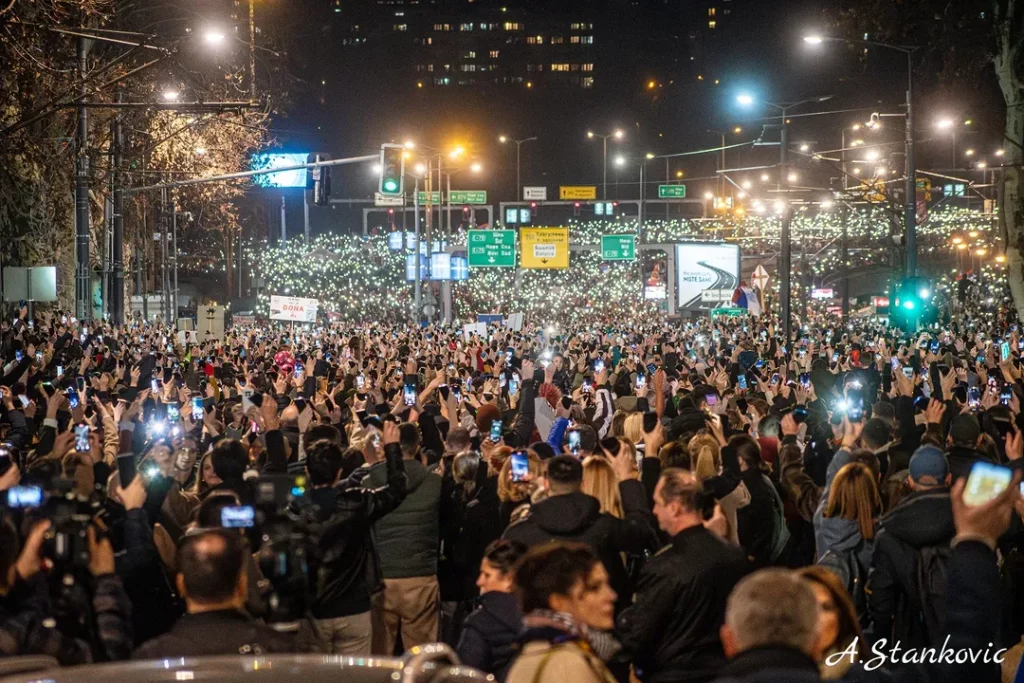 Protest rally in Belgrade, January 27, 2025; Photo: Aleksa Stanković/Instagram
Protest rally in Belgrade, January 27, 2025; Photo: Aleksa Stanković/Instagram
Unlike Tbilisi, Belgrade has shown a willingness to compromise somewhat. In January 2025, when a strike and protest peaked, Vučić announced the intention to drop charges against some students and professors and reshuffle the government fundamentally. He hinted at new elections as possible, and the Prime Minister stepped down. The Serbian government released some—but not all—documents related to the train station reconstruction. Protesters are distrustful of these steps and voice their disappointment.
“I think nobody believes those documents are trustworthy,” Vujic argues, and Veijvoda agrees: the protests will not go away until the broader students’ movement is satisfied, he claims. He also concedes that the full release of the Chinese contract documents could be “political suicide” for Vučić because it would likely reveal which crony companies linked to his party were involved and how they siphoned off money from the project.
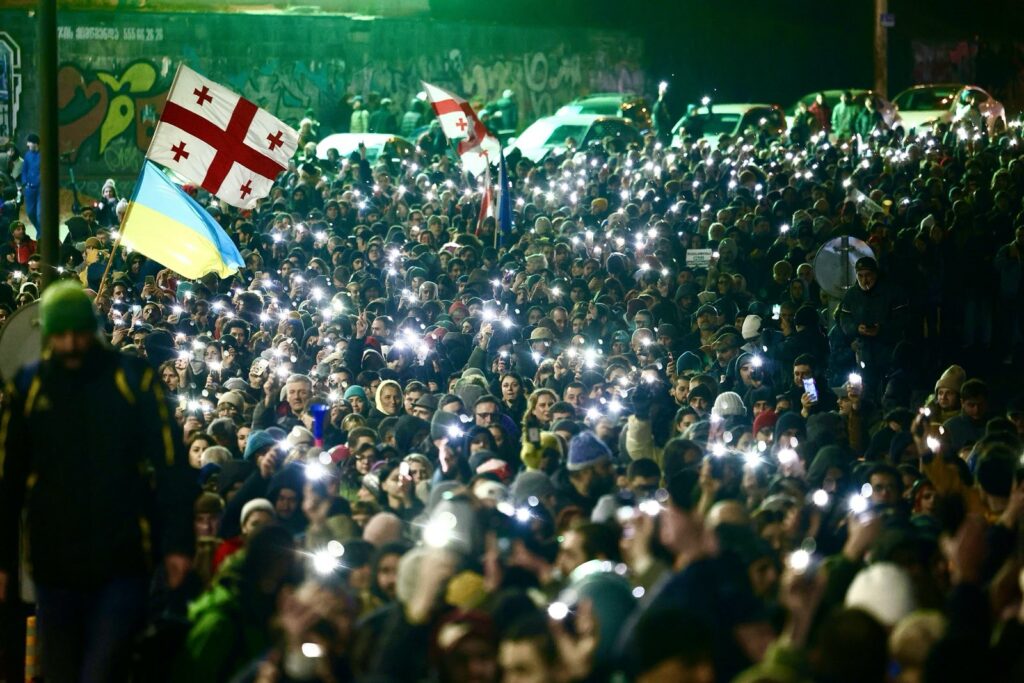 Protest rally in Tbilisi, January 30, 2025; Photo: Guram Muradov/Civil.ge
Protest rally in Tbilisi, January 30, 2025; Photo: Guram Muradov/Civil.ge
Georgia’s ruling party, on the other hand, refuses even to consider the protesters’ demands so far, responding with ever-harsher legislation aimed at intimidating and suppressing dissent. Here is another dramatic difference: even though in Serbia, protesting students have been attacked by the ruling party thugs, and there is a hushed conversation about security services tracking the leaders’ communications, the police have not been deployed to counter or quash the protests. Perhaps this is out of fear that police violence would further expand resistance or that Brussels won’t be able to ignore police violence. “Every single escalation so far just boosted the protests. Police violence might be the final boost,” Vujic says. The fact remains – despite its Euroskepticism and latent Russophilia, Belgrade seems to care more about what its citizens and European partners think about its conduct.
What comes next?
Forecasting the political outcome of the ongoing social movements is no easy task. In Georgia, the demands are explicitly political, as the upcoming elections offer a clear path to regime change through peaceful means. And even though the opposition political parties are in poor shape – disunited, struggling to formulate uplifting messages or spearhead protests – new political movements seem to be consolidating. In Serbia, the protesters – mostly students – have deliberately distanced themselves from politics, or more precisely, from the party-political scene. For them, politics is a “dirty” business they want no part of. In many ways, similar sentiment was dominating Georgian protests up until the recent crisis. Having been booed many times, the party politicians no longer even try to address the rallies from the podium.
“This protest is above politics. It is about morals and ethics,” says Milan Vujic, who is certain that the movement, born out of pure human tragedy, will have a political outcome. He believes regime change will be an “indirect consequence” of what is happening in Serbia.
“The movement is deeply political. It is superficially not political in terms of political parties […] but it is deeply political because it is about re-democratizing society and bringing back liberal democratic governance,” argues Ivan Vejvoda.
None of them believes that Vučić can be changed or rehabilitated. In a best-case but unrealistic scenario, Vejvoda says, Vučić would purge his government of corrupt officials, appoint “clean people,” restore the independence of the judiciary, and implement other reforms. “But that won’t happen,” he says, because the regime is built on a “kleptocratic foundation.”
There are also calls in Serbia, mainly from the opposition, for a technical transitional government, but neither the protesters nor Vučić want or believe in this option. Both countries’ opposition remains fragmented and disunited, lacking trust and credibility in the broader society. In both cases, this is at least partly the result of repression that long-seated ruling parties have used against their political opponents and the capture of the independent institutions and media. How would the boiling streets translate into meaningful political voices and gain the legitimacy to govern? This is an outstanding question without a response.
Copy URL
URL Copied
Source link : http://www.bing.com/news/apiclick.aspx?ref=FexRss&aid=&tid=67b7748776f04bb1937ca347b6f39aa1&url=https%3A%2F%2Fcivil.ge%2Farchives%2F663436&c=14868246225813126195&mkt=de-de
Author :
Publish date : 2025-02-19 06:08:00
Copyright for syndicated content belongs to the linked Source.

